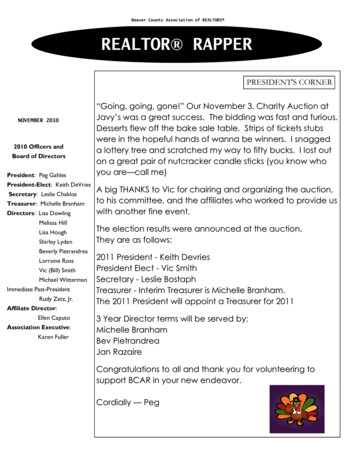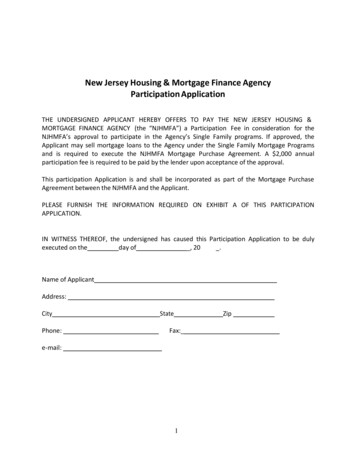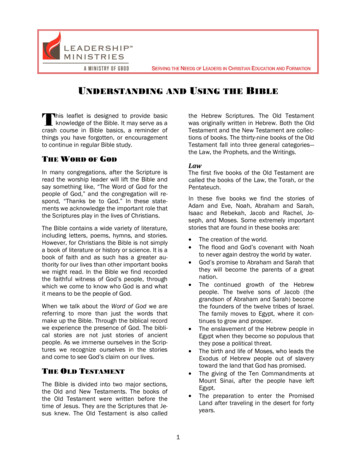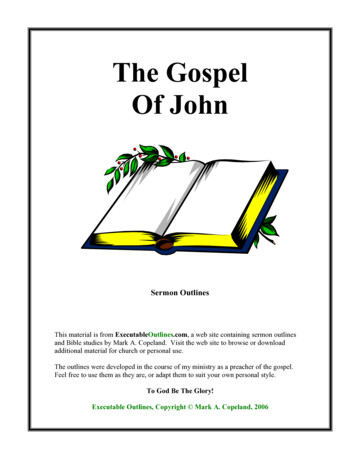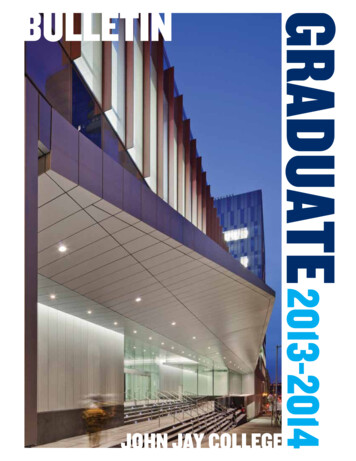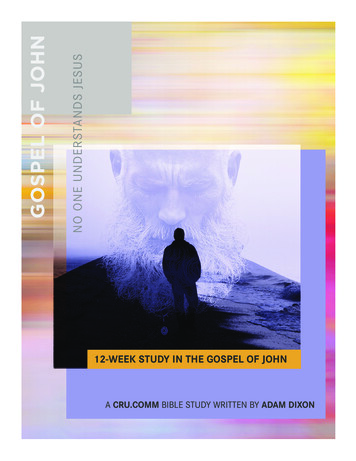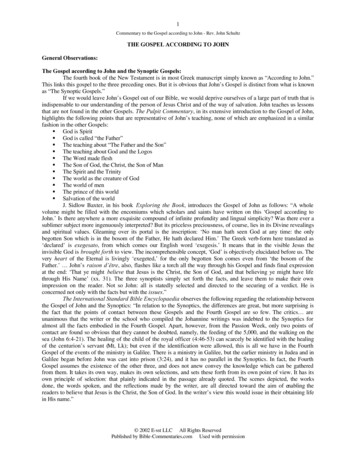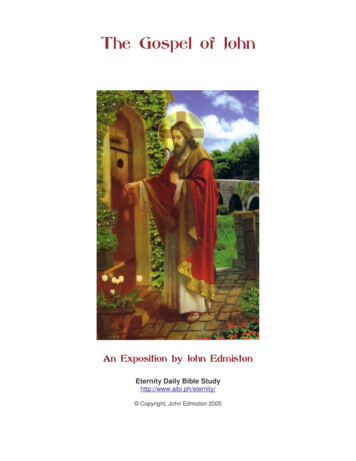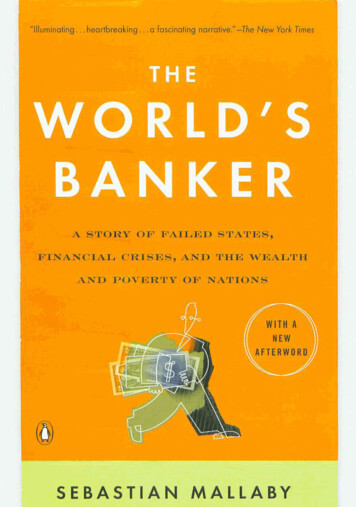
Transcription
BANKERA STORY O F FAILED STATES,FINANCIAL CRISES, A N D THEWEALTH A N D POVERTYOF NATIONSA Council on Foreip Relations BookPENGUIN BOOKS
P E N G U I N BOOKSTHE WORLD'S BANKERSebastian hlallaby has been a Wnshi?jgton Post columnist since 1999.From 1986 to 1999, he was on the staff of The Economist, serving inZimbabwe, London, and Japan, as well as serving as the magazine'sWashington bureau chief. He spent 2003 as a fellow at the Council onForeign Relations and has written for Foreig?zA'airs, Foreiglz Poliry, TheNew York Times, and The New Republic, among others. H e was born inEngland and educated at Oxford, and now lives in Washington, D.C.,with his wife and children.
CONTENTSPREFACE:The Prisoner of L a p u tiCHAPTER O N E :ATale of Two AmbitionsCHAPTER W O :"World Bank&1urderernCHAPTER FIVE:41The Renaissance PresidentCHAPTER THREE:ATwisterinAfricaCHAPTER FOUR:11h/lission Sarajevos41 16CHAPTERs I X : Narcissus and the OctopusCHAPTERs EVEN : The Cancer of CorruptionCHAPTER TEN:i 451Uganda's Myth and MiracleCHAPTER EIGHT:CHAPTER NINE:65zo 7A Framework for DevelopmentFro nSeattle to TibetCHAPTER ELEVEN:CHAPTER TWELVE:7423226 1Waking Up to Terror2.613A Plague upon Development313
CHAPTER THIRTEEN:Back to the FutureCHAPTER 73ALionatCarnegie422336374
Praise for The GhrL ikBanker"A sophisticated, evenhanded take on the bank's last decade of developmentefforts. . . Illuminating . . . Heartbreaking. . . [Mallaby] has produced a bookchock-full of affecting vignettes. and that rarest of treats--an informed disquisition about public policy wrapped up in a fascinating narrative."-The New York Timer."The World1Banker sets out to be a biogaphy of hk.Wolfensohn, but it is reallyas much about the rich world's relations with the poor. Ah.kIallaby writes aboutthis vast topic with vigor and wit, and in a tone so reasonable it makes you wantto slap the people who scale office blocks to unfurl banners proclaiming that the'World Bank Approves China's Genocide in Tibet.'. . . MI-.Wolfensohn comesacross as filled with 'a roaring restless hunger to do all the things that man cando, and to succeed at dl of them.' On the negative side, he is so vain that heprefers to shout at his subordinates than share credit with them. H e probablywon't like this book. But anyone else who cares about development will."-The Ecorronrirt"Sebastian Mallaby's fiscinating book on the World Bank is both titnely and anexcellent read. . . . [R ldaby]has a talent for brilliant writing and penetratinganalysis. . . H e brings to the book. . . an ability to tell his tale engagingly andwith copious amount of the kind of 'inside' gossip that enlivens the pages of hisnewspaper. . . .Whoever succeeds hlr. TVolfensohn needs to read tllis masterlybook."-Jagdish Bhagwati. Fitlancial Tivzer."A fascinating, lively account of a man and an institution grappling with themammoth challenges of poverty, development, and global politics. SebastianMdabyb finely etched tale is both troubling and inspirational."-Robert Kagan"Sebastian Mallaby one of the most clear-eyed writers of his generation, hasdone something briiant with The WoTIdjBanher. In a book that grips the readerto the last page, he has used the oversized character of1Vorld Bank president JimiVoLfensohn to provide a piercing look at world poverty and the West's ceaseless-David Marannisand sometimes contradictory experiments in fighting it.""Sebastian hlallaby has done the impossible. I-Ie's written a book about globalpoverty that is an urterly compelling read. hlIallaby uses the larger-than-life figure of James Wolfensohn and his presidency of the World Bank to tell the tale.There's intrigue. gossip, color, and humor all mixed in with high intelligence.But throughout there is also a deeply felt desire to do something for the world'sthree billion people who live on less than two dollars a day. In writing this wonderful book, Mallaby has helped shine a light on what should be the great-Fareed Zakariastruggle of our times.""This readable book is much more than a portrait of a contradictory and coinplex character. It also offers a provocative account of U'olfensohn's two five-yearterms . . . that bookmark an intense period of change in the World Bank's sixtyyear history. . . . The World'sBanker is an engrossing story. At its heart is a fasci-
nating character and a lively retelling of the tortured history of an importantinstitution that almost no one understands."-Brrcir rrsl.I'eeK"The World) Bartker is a riveting portrait of the World Bank and its mercurialpresident of the past ten years. James Wolfensohm. . . . Mallaby's book may wellbe the most hilarious depiction of a big organization and its controversial bosssince Michael Lewis's Liars' Poker."-Rahul Jacob, Financir?/Titnes Weedend hlngazine"With a bright, breezy. . . and assured style that reflects his years at The Ecmromist, the author takes the complex and (let's admit it) potentially excruciatingtopic of the Mlorld Bank and makes it accessible to the general reader. . . It is toMr. hfallaby's credit that his readers, like the developing countries the IVorldBank was designed to assist, will be left asking for more." -ThcNew York Sutt."1wvonder if Sebastia lMallaby had Stevenson['s Dr. Jekyll andM7: Hyde] in theback of his mind when he was writing this book, for the \Vorld Bank PresidentJames \Volfensohn he portrays herc appears to be almost ttxactly 50 percentJekyll and 50 percent Hyde. lVolfensolm/Jekyll is the irresistible charmer seen athis vacation home in Jackson Hole, Wyoming, who can turn bitter foes into bestfriends (or at least 'frenemies') with a single shot of his charisma. FVolfensohn/Hyde is the intolerable monster seen on IITall Street and in kV;lshiilgton,whoseegocentric tantrums have just the opposite effect. The moral ofMallaby's story isthat iVolfensohris presidency of the \eVorld Bank would have been more successful had Dr. Jekyll been in sole charge. But that may underestimate the usefulnessofIi4r. Hyde. . .Wolfensohis career is an astonishing story in its own right, andMallaby, an accomplished British journalist wvho is now a l&zshi?rgtunPost edito-Niall Ferguson, Tbt lihshi? gtot Post Book M'or/drial writel; tells it well.""Awell-researched piece of reportage . . The l%r/di B nkeris a dishy account ofthe intramural struggles ofkvolfensohn and the other demigods of global development upon whose efforts the fate of rnillions may dcpend."-Son Francisco Chronicle"What the author accomplishes in The I%riJs Banker is emaordinary: hlallabyhas transformed the recent history of the World Bank into a page turner."-Richard Adanls, The Guardinn"A swiftly moving talc of what goes Dn behind the vaults at the \Vorld Bank,aninstitution led by a vigorous, cantankerous and polarizing boss. . .hlallaby takesa breezy, human-interest approach to all of this, as scems fitting with such alarger-th.m-lie 'outsized ch,macteragainst outsized problems.' But whatis best about this very good work is not its high-flying characters, well handledthough they are, bur its enthusiastic effort to personfi the World Bank. . . .Aworthy essay in institutional dynamics as much as financial history and inter-KirAzu Rewiews (starred review)national development."
PREFACETHE PRISONER O F LILLHPUTto pick an argument. I wrote it for theromantic match between the two main characters. O n one side thereis Jim Wolfensohn-screamer, schemer, seducer; Olympian, musician,multimillionaire; by no means a saint but by any standards a fantasticforce of nature. On the other side there is "development," an umbrellaterm for humanity's most intractable headaches-ignorance, illiteracy,malnutrition, AIDS-thetoughest challenges of globalization. Aspresident of the World Bank since 1995, Jim Wolfensohn has grappledwith thcse challenges, an outsized character pitted against outsizedproblems. I wanted to write a book that followed Wolfensohn throughthe villages and capitals where he fought his battles, and to see whatlarger truths those battles illuminated.The persistence of extreme povertJI has fair claim to being the greatest outrage of our times, and the World Bank is the main instrumentthat rich nations have to fight it. We live in an age when millions ofpeople die because they were born in the wrong place: one section ofhumanity enjoys 2 lattes and disposable cameras; the other sectionlives on 2 a day and appears itself to be disposable. It costs 2.50 to buya bed net to keep out nalarialmosquitoes, but the United States, whichspends more than 9 billion on movie tickets annually and lands rocketsI D I D N IT W R I T E TH I s B O O K
2THE W O R L D ' SBANKERon Mars, somehow can't get bed nets to the African children who diefrom malaria at a rate ofroughly two per minute.' What struggle is morenoble than the battle against this waste of human lives?Jim Wolfensohnfeels this with a consuming passion: "It's all I think about," he said, earlyin his tenure; "I wake up in the morning thinking about it and I go tobed thinking about it." And yet, what struggle is more difficult either?Allore than any other institution, the World Bank has strived to understand the chaallenge of development: to create a delivery mechanism thatcan turn a sliver of the rich world's wealth into progress against poverty.The World Bank was conceived six decades ago, along with the Internatiollal Monetary Fund, when Franklin Delano Roosevelt and hisallies bvere engaged in mortal combat with Germany and Japan. Thefounders' purpose was twofold: to relieve human suffering, certainly, butat the same time to control the economic chaos that threatened the richworld's security. The hyperinflation and mass unemployment of theinterwar period had fueled the rise of fascism and communism inEurope: desperation had led to desperate isms.The International R4one t q Fund was meant to head off a repetition by fighting currencycrises; the World Bank had a broader mandate to develop broken-downeconomies. As the world changed, the Bank's functions evolved, but itsrole in international-security strategy has persisted. With the onset ofthe cold war, the Bank's mission was to prevent Latin Americans andAfricans and Asians from joining the Soviet column. I n the new age ofterror, the Bank's efforts in the poor world offer the best chance of preventing the proliferation of failed states that sen7eas havens for terror.hleanwl ilepoverty is the vector for other threats to our securityglobal diseases, drug trafficking, and environmental degradationwhich can thrive uncl eckedin desperate countries. In Kosovo, in EastTimor, in Afghanistan, and to a lesser extent in Iraq, the World Bankhas also emerged as a key player in the nation-building efforts that havebecome a feature of the past decade.
THE PRISONEROF LlLLlPUT3The World Bank is a strange kind of a bank, extremely good andfrustratingly bad, not unlike its president. It lends money to poorcountriessome 20 billion a year-but its real importmce lies in itsinfluence over the developing world's policies. I n the words of one critical account, the Bank has "more to say about state policy than manystate ," and while that goes a little far, the general point is valid. TheBank's ten thousand professionals form the brightcst concentration ofdevelopment thinkers anywhere, and they combine brain power withpractical experience; they spend years in the toughest corners of theearth, fighting to get children into schools or water into villages. In manypoor countries, World Bank economists drive government strategy oneverything from AIDS to civil-service reform to macroeconomic policy. Other big aid donors-the United States, Japan, and the leadingEuropean powers-can be influential, too. But the Bank is almost always in the lead, partly because a multilateral institution is best placedto coordinate rived flag-waving programs, but mostly because the Bank'sanalytical machine has more intellectual juice in it.Jim Wolfensohn came to the Bank with his own kind of juice, andthe mix has been explosive. H e grew up in Australia, represented hiscountry at the 1956 Olympics, then went to Harvard Business School.H e became a master deal maker in the City of London and on WallStreet, leading the rescue of the Chrysler car company in 1979 andamassing a fortune of well over Sroo million. H e chaired New York'sCarnegie Hall and Washington's Kennedy Center for the PerformingArts while running his own firm, and he performed concerts himselfalongside the world's best musicians. H e had a swashbuckling energythat took the World Bank by storm, lifting it out of a dark time when itwas surrounded by critics of both left and right who called for its abolition. But the Bank is a proud institution, and its formidable technocratsdid not always take kindly to Wolfensohn's high-voltage style. And sothere followed a titanic clash: in one corner, a plutocratic financier who
4THE W O R L D ' SBANKERalways got his way; in the other, a phalanx of superqualified experts withyears of develop nentexperience. I t was unstoppable force versusimmovable object, and both sides finished up in unexpected places.There could scarcely be a better time to tell this story, for howeverexcellent the Bank's professionals, and however vital their mission, theWorld Bank shares the fragility common to most multilateral institutions. We veer between contempt for international bodies-the UnitedNations, the International Monetary Fund, and likewise the WorldBank-and unrealistic pronouncements on what they ought to do:forge peace, banish financial instability, lift every person out of poverty.It has become com nonplaceto say that our global institutions are notup to the challenge of our unprecedented global interdependence. Butthe reason for this mismatch lies partly in our schizophrenia. Sometimes we pour scorn on the Bank and other international bodies, andstarve them of resources. Sometimes we talk as though they must havesuperhuman strength, and we lumber them with impossible objectives.When President George W. Bush took office, it was the contemptthat seemed most threatening. In 2001 and 2002, the Bush Treasuryassailed the Bank with a mixture of aggression and plain ignorance, asthis book will describe later. In early 2003, the Bank was left out of theplanning for Iraqi reconstruction by the Pentagon, even though it hadvaluable experience from other nation-building exercises. The Pentagon's attitude did not prevent the Treasury from attacking the Bank fordoing too little in Iraq; days after Jim Wolfensohn visited Baghdad inthe summer of 2003, and days before a World Bank expert was killed byIraqi insurgents, The Wall Street Journal published an editorial broadside about the Bank's lack of involvement in the country. Throughoutthis period, the very idea of the international system was called intoquestion; some parts of the administration believed we lived in a z nipolarworld-that the United States was the international system. Theunipolar fantasy is a trap, for it is only in military matters that Americanpower is overwhelming. In the economic realm, the United States is the
THEPRISONEROF LlLLlPUT5leading power, but it is not the only power; it depends on foreigners toopen up trade, to prime the pump of global growth, and to provide thesavings that pay for the federal government's spending habits. In otherfields-the ones that occupy this book-the limits to American dominion are even more pronounced. You cannot fight AIDS or migration orenvironmental challenges unilaterallyBy 2004, the setbacks in Iraq had made the limits to Americanpower obvious, and the contempt for international institutions hadfaded. In the meantime, however, multilateralists sometimes made theopposite mistake, insisting that the World Bank should tackle povertyas though by magic. The roots of this magical unrealism are understandable: When you know that &cans die for want of 2.50 bed nets,you want to yell and scream that the problem must be fixed; surely allyou need is will and money? But those ingredients are sadly notenough. To get bed nets to children, you need a distribution nenvorkrun by competent people; you need systems for handling the financesinvolved; you need peace where the children are living, and it helps ifparents and health workers have not been carried off by AIDS or cvar orfamine. The World Bank can make advances against poverty, as thisbook will describe; anybody tempted to dismiss development as hopeless should remember that benveen 1990 and 2015, the world is likely tohalve the proportion of people who live below the I-a-day line. But itdoesn't help to set ambitious humanitarian targets if meeting them isgoing to be impossible. The world has committed itself, for example, toreaching a set of &ugetsknown as the Millennium Development Goals,which include universal primary school enrollment and a two-thirdscut in child mortality. When those goals are not met, the World Bankand other development agencies will be branded as failures. The criticsof the multilateral system will be back, their contempt more poisonousthan ever.The Bank is large, lavish, and has lasted sixty years; it may seem outlandish to suggest that it is vulnerable. Yet it is not just our schizophrenia
6THE W O R L D ' SBANKERthat threatens its future; the Bank is under constant attack from feistynongovernmental organizations (NGOs) that ought to be its naturalallies. At first sight this is paradoxical: the Bank's combination of powerful minds and noble motives is glorious, or at least ought to be; thisbook will introduce you to the dedicated pros who flew into war-tornBosnia on military transports, who battled poverty amid Indonesia's revolution, who thought up new ways of combating human suffering inAfrica. And yet, if the World Bank is unpopular, it is not difficult to seewhy. In large parts of the world it has promised heaven and left peoplein hell: 3 billion people, or half of all humanity, continue to live on lessthan 2 daily. Its intellectual dominance has made it arrogant, fieling theresentment of NGOs that feel locked out of the big decisions on development. Encased in their palatial headquarters in Washington, observedat their annual meetings hobnobbing with global finance's A-list,World Bankers have been too easily portrayed as pin-striped pointyheads, cut off from the real problems of the world's poorest people.The clash between the Bank and NGOs ought to concern all of us,because the Bank may not survive it. Over the past decade-the firstInternet decade-it has been fashionable to predict upheaval in thebusiness world: noisy, nimble, entrepreneurial upstarts, with flat structures and low overheads, would destroy the lumbering hierarchies of theold era. But the triumph of the nimble is actually more a public-sectorthing, and I believe it is a worry. In many of the world's rich capitals,and especially in Washington, public policy is decided by a bewilderingarray of lobbies and interest groups and advertising sneak attacks, andgenerally by people who campaign single-mindedly for narrow goals:benefits for veterans, subsidies for Farmers, tax loopholes for businesses.A similar army of advocates pounds upon the World Bank's doors,demanding that Bank projects bend to particular concerns: no damageto indigenous peoples, no harm to rain forests, nothing that might hurthuman rights, or Tibet, or democratic values. These constant N G Ooffensives tie up the World Bank, frequently disabling its efforts to
THEPRISONEROF LlLLlPUT7fight poverty; despite their diminutive stature, the Lilliputians are winning. Unless we wake up to this danger, we will lose the potential forgood that big organizations offer: to rise above the single-issue advocacy that small groups tend to pursue, and to square off against theworld's grandest problems 11all their hideous complexity,So if the first threat to the multilateral system lies in our alternatingbouts of millenarianism and contempt, a second one hides in the cacophony of our advanced democracies. I encountered this problem in&lay 2003, on a visit to East Africa. The World Bank was promoting adam near the source of the river Nile, at a beautiful spot called Bujagali.Western NGOs were in revolt: the International Rivers Network, basedin Berkeley, California, proclaimed that the Ugandan environmentalmovement was outraged at the likely damage to the Bujqali waterfalls,and that the poor people near the site would be uprooted from theirland and livelihood. The activists' resistance had tied up the Bank forseveral years, delaying a project that would get electricity to clinics andschoolrooms that lacked lights and to industries whose productivity waswrecked by a lack of reliable energy. It is true that the Bank has a badhistory with dams, backing schemes that have harmed both people andthe environment, so journalists based in America or Europe oftenbelieve the NGOs' charges without being able to check them. But now Iwas in Uganda, a few hours' drive from the proposed dam, so I called upthe Berkeley activists and asked for some advice. W h o ran this Ugandan environmental movement that was so outraged? Where were thesevillagers who would be cruelly dislocated?Lori Pottinger, the International Rivers activist who led the Bujagalicampaign, was not exactly forthcoming. Her 1oc.d counterparts werepreoccupied, she said; and snooping around the villages at the Bujagalisite would get me into trouble with the Ugandan authorities. I trackeddown the environmental group that she worked with anyway, and telephoned the office; I was invited to come over straight away, and thegroup's young director sat me down in his office and plied me with
BTHE W O R L D ' SBANKERleaflets and reports, which gratefully acknowledged the sponsorship of agroup called the Swedish Society for Nature Conservation. After halfan hour of conversation, I asked the question that really concerned me:What kind of organization was this?"This is a membership organization," 1was told."How many members?" I asked. M y host kindly got up and rummaged about in his desk, returning with a blue notebook."Here is the list," he said triumphantly. I looked. Uganda's NationalAssociation of Professional Environmentalists had all of twenty-fivemembers-not exactly a broad platform from which to oppose electricity for millions.hlfy next move was to visit Bujagali. I hooked up with a Ugandansociologist who knew the region well, and who promised to translate forme. At a little cluster of buildings on the edge of the dam site, shestopped and checked in with the local government representative; farfrom threatening to call the cops, he grinned and climbed into the carwith us. For the next three hours, we interviewed villager after villager,and found the same story; the dam people had come and promised generous financial terms, and the villagers were happy to accept them andrelocate. My sociologist companion said maybe we had sample bias; wewere interviewing men, who might be only too willing to spend cashcompensation on booze, leaving their families with notling. So weinterviewed some women, too, and they offered the same pro-projectline. The only people who objected to the dam were the ones living justoutside its perimeter. They were angry because the project was notgoing to affect them. They had been ofTered no generous payout, andthey were jealous of their neighbors.This story is a tragedy for Uganda, since millions of Ugandans arebeing deprived of electricity-deprived by Californians whose idea ofan electricity "crisis" is a handfd of summer blackouts. But it is also atragedy for the antipoverty fight worldwide, since projects in dozens ofcountries are being held up for fe.x of activist resistance.This would not
THEPRISONERDF L l L L l P U T9happen if American and European politicians could tell good NGOsapart from unreasonable ones, and could close their ears to unjustifiedcomplaints. But this apparently is hard: time after time, maliciousInternet-enabled groups make scary claims about the iniquities of Bankprojects, and the government officials who sit on the Bank's boardbelieve them. I n the face of this pressure, the Bank is often forced to goto absurd lengths to prove that its projects will do no harm--even commissioning, in the case of one project I will describe, an environmentaland anthropological study that ran to nineteen volumes. Small wonderthat the Bank is attacked for being maddeningly slow. It is indeed slow,but the reasons lie mainly outside it.With great fireworks sho vsof energy, Jim 1Volfe11sohnhas fought torejuvenate the Bank; the battle has been messy. H e has shaken the institution by the hair, booting almost every senior manager out of the door.and recasting the Bank's structure and mission. H e would stroll downthe Bank's corridors in the early days and accost a random official-"I'msurprised you're still here!" he'd say, leaving the unfortunate target towonder whether it was time to start clearing out his office. And yet,under Wolfensohn, the Bank has made headway. In the Balkans, it hasdemonstrated that it can be a marvelous tool of Western strategy; inUganda, despite the frustrations of the Bujagali dam, it has helped to liftone in five people out of poverty; all over the world, the WolfensohnBank has opened up the development agenda to new players and subjects. But for all Wolfensohn's ferocious personality, there are limits towhat he cSanachieve. H e cannot succeed-nobody can succeed-unlessthe rest of us wake up to the Lilliputian menace and contain our tendency to oscillate between contempt for multilateral outfits and excessive expectations. I have recounted Wolfcnsohn's struggles mostly for theioy of the story, but also to show why, if the World Bank is worth criticizing, that's because it's so well worth defending.Jim Wolfensohn is the most ambitious man I know, and the Bank isthe most ambitious institution. A dreamer who wants to do everything
1 0THE W O R L D ' SBANKERin the world stands atop m organization that wants to change everything within it. We live in an era of technologists who shrink the globeand biologists who clone species and a superpower that seeks to remakethe Middle East in its own image. Surely Wolfensohn's story is a sort ofsaga of our times? It is a tale of ambition multiplied by ambition, and ofambition's limits.
CHAPTER THIRTEENBACK TO THE FUTUREa young idealist called John Briscoe arrived in Bangladesh.H e had left the oppressive atmosphere of his native South Africa; hehad earned a P h D at Hanrard; now he was coming to live in a village.H e chose a place called Fatepur, which was perched upon an island thatwas surrounded by the tentacles of the world's second-largest riversystem. Life in Fatepur was miserable. For four months of each year, thevillage was under several meters of water. The houses were perched on n u dplinths, and even in the dry season the nearest market was an houraway by boat, The people survived by working in the teams of humanmules that pulled barges up the river; they planted a special breed offloating rice in their submerged paddy fields, which looked wonderfullyexotic but which yielded little to eat. Malnutrition and disease werepresent constantly. The average person in Fatepur died before age fifty.'For a y o whiten g South African, radicalized already by the abornination of apartheid, Fatepur was enough to confirm Marxist sympathies. Observing life in the village "was like reading hlarx and Engelson nineteenth-century Europe," Briscoe wrote later; the dominant families practiced the "naked, shameless and direct exploitation of the market," forcing the poor to sell their meager plots of land at knifepoint,driving their families below the margin of subsistence. When BriscoeIN1 9 76 ,
BACK TO THE FUTURE337heard of a proposal to build an embankment around Fatepur, he wasconvinced no good would come of it. In theory, the wall would protecthomes from the annual flood tide and capture water to supply an irrigation system. But Briscoe interviewed families from all social strata; heconcluded that the rising value of land resulting from the embanlunentwould merely encourage powerll fanlilies to grab it. In the absence ofrevolutionary political and social change, the project would entrenchthe misery of the majority.Two decades later, Briscoe was working for the World Bank inWashington. The Bank, in a strange way, had caught up with his youthful radicalism. It no longer believed that infrastructure was the route tohuman betterment. In the 1960s and I O itS had,moved from buildingphysical capital to building human capital, and now it was moving fromhuman capital to social capital-which was another way of saying thatit was promoting the revolutionary po1itic.d and social change thatBriscoe had hoped for in his youth. In the new Bank of the rggos, ScottGuggenheim was out in Indonesia working to change village powerstructures under the feet of a dictator; and Hans Binswanger waspreaching the gospel of Community Driven Development, gettingmoney into the hands of the humblest villagers in h/lexico.Jim Wolfensohn himself spoke the language of solidarity with the least fortunate:he wanted the Bank to focus on the human aspects of development; hedid not care about concrete. To promote a sense of identification withthe poorest, Wolfensohn was sending his ivory-tower professionals offto spend a week in a village.John Briscoe was glad to take this opportunity, and in 1998, he wentto Fatepur again. What he saw amazed him. The villagers who hadalways struggled with disease now looked radiantly healthy. They woreclothes instead of rags, and their children were in school. Bustlingmarkets had sprung up, and women were newly independent. Lifeexpectancy had jumped by nearly two decades. It was a transformationthat had taken centuries in many places; here it had
CHAPTER EIGHT: Uganda's Myth and Miracle zo 7 CHAPTER NINE: A Framework for Development 232 CHAPTER TEN: Fro n Seattle to Tibet 26 1 . with a single shot of his charisma. FVolfensohn/ Hyde is the intolerable monster seen on IITall Street and in kV;lshiilgton, whose egocentric tantrums have just the opposite effect.
